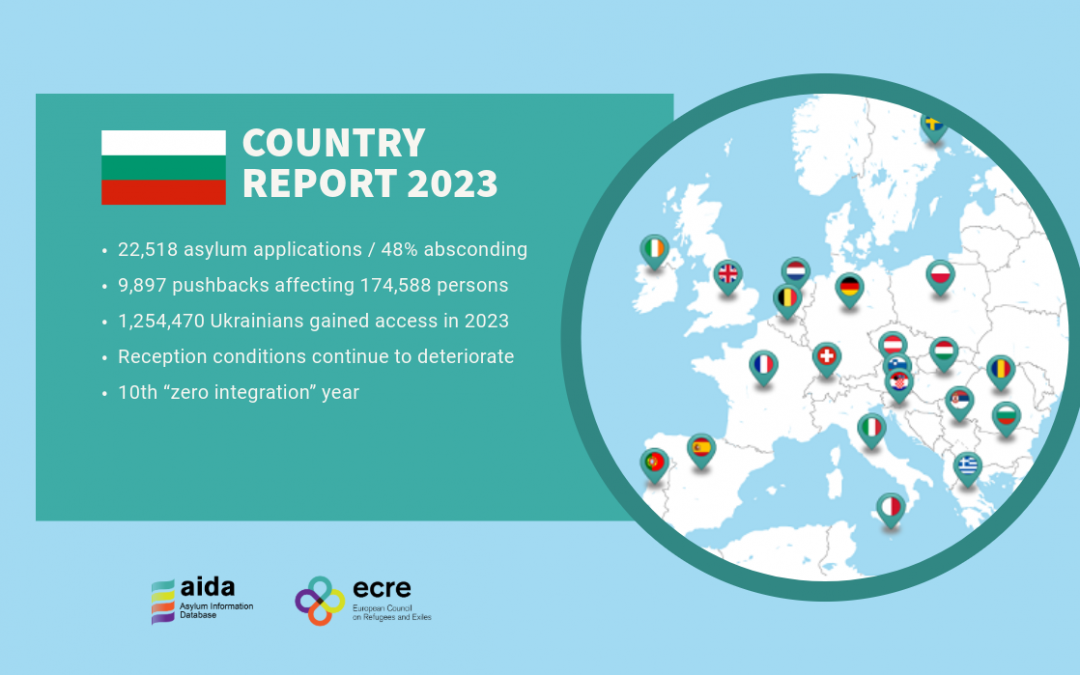The updated AIDA Country Report on Bulgaria provides a detailed overview of legislative and practice-related developments in asylum procedures, reception conditions, detention of asylum seekers and content of international protection in 2023.
In 2023, Bulgaria continued to apply different approaches to granting access to its territory, with people fleeing the war in Ukraine enjoying unimpeded access to the territory and to temporary protection, while asylum seekers from the Global South continued to suffer from the lack of any sanctioned pathways or prospect of integration into the country. A total of 1,254,470 Ukrainians gained access to Bulgaria in 2023 and, as of 31 December, the country had 52,580 temporary protection beneficiaries. Meanwhile, Bulgaria’s pushback practices at its borders with Türkiye and Greece continued to dramatically increase, with the National Monitoring Mechanism recording 9,897 pushbacks affecting 174,588 individuals, more than double compared to those registered in 2022. Notwithstanding, 2023 also saw a record high number of asylum applications since the establishment of Bulgaria’s national asylum system in 1993, with 22,518 registered applicants, mainly from Syria (55%) and Afghanistan (26%).
48% of asylum seekers (16,211 out of 33,703 applicants) abandoned their asylum procedure and absconded in 2023, a minor increase compared to 46% in 2022. The main reasons for this high absconding rate are attributed to the significant length of the procedures, the low recognition rates for certain nationalities and poor reception conditions. In 2023, the State Agency for Refugees (SAR) issued a record 24,949 asylum decisions, including 106 granting refugee status, 5,682 granting subsidiary protection, 2,950 refusing international protection and 16,211 discontinuing asylum applications. Several improvements in the standards and quality of the asylum procedure were also observed, which provided for better safeguards for asylum applicants pending their status determination.
The overall recognition rate decreased from 91% in 2022 to 66% of all decisions on the merits, with recognition of refugee status decreasing to 1% and subsidiary protection to 65%. After a sharp increase in 2022, the recognition rate for Afghan nationals dropped again to 14%. 100% of Turkish applicants were rejected.
In co-operation with the Austrian Migration Service and the European Commission (EC), Bulgaria launched a pilot project aimed at channelling into accelerated asylum and return procedures an increased number of applicants originating from countries included on Austria’s national list of safe countries of origin (mainly Algeria, Morocco and Tunisia). Less than 1% of those processed under the pilot, which were all conducted under the accelerated procedure, were admitted into the regular procedure. Thus, despite mixed results including in terms of prevention of absconding, the EC expressed its will to renew it in 2024.
The conditions in the vast majority of reception centres continued to deteriorate, in terms of infrastructure and material conditions, often failing to provide even the most basic services such as adequate nutrition, healthcare and sanitation of personal and communal spaces. Issues of access to water, usable utilities, poor sewage have also persisted. According to stakeholders, the safety and security of reception centres’ residents remained the main concern. Access to healthcare and medical supplies also continued to be a significant problem. SAR did not receive the funds it requested for refurbishment and, hence, the overall reported accommodation capacity remained at 3,592 places. As in 2022, many unaccompanied children were accommodated in mixed premises with adults, without proper support and guaranteed personal safety.
Regarding integration, 2023 marked the tenth consecutive year of the national “zero integration” policy: no activities were planned, funded or made available to beneficiaries of international protection, and only a few benefited from integration support. However, SAR continued its efforts to actively search for accommodation alternatives for unaccompanied children, seeking or granted international protection and 43 were accommodated in specialised childcare centres. In another positive change, SAR fully abandoned its recent malpractice of undue cessations of international protection based on the expiration of Bulgarian identity documents.
The full report is available here and the temporary protection annex to the report is available here.
For more information about the AIDA database or to read other AIDA reports, please visit the AIDA website.

